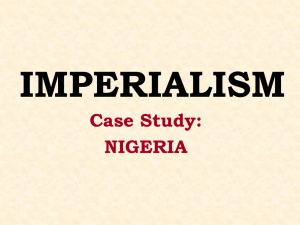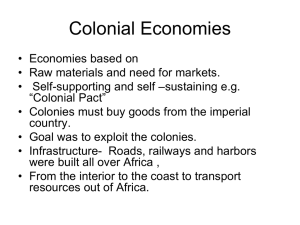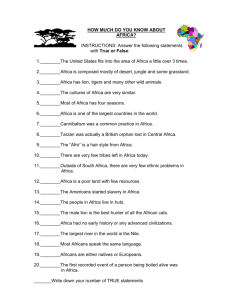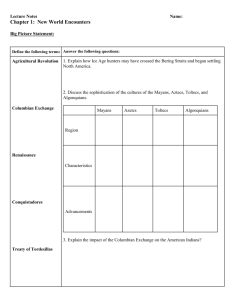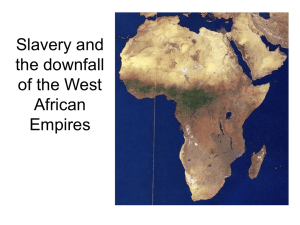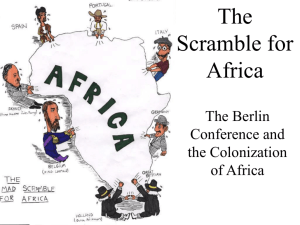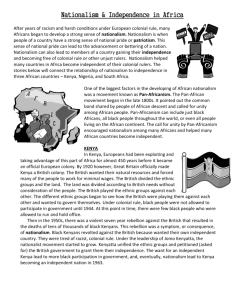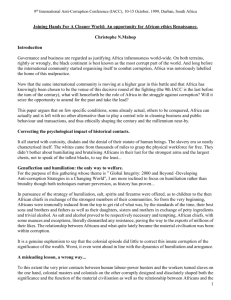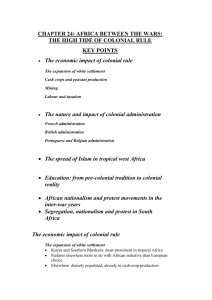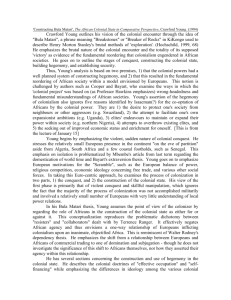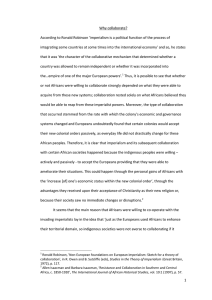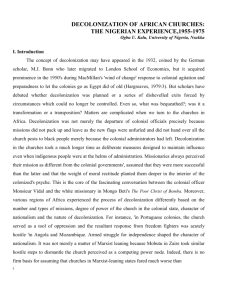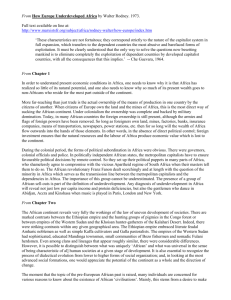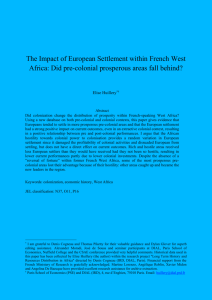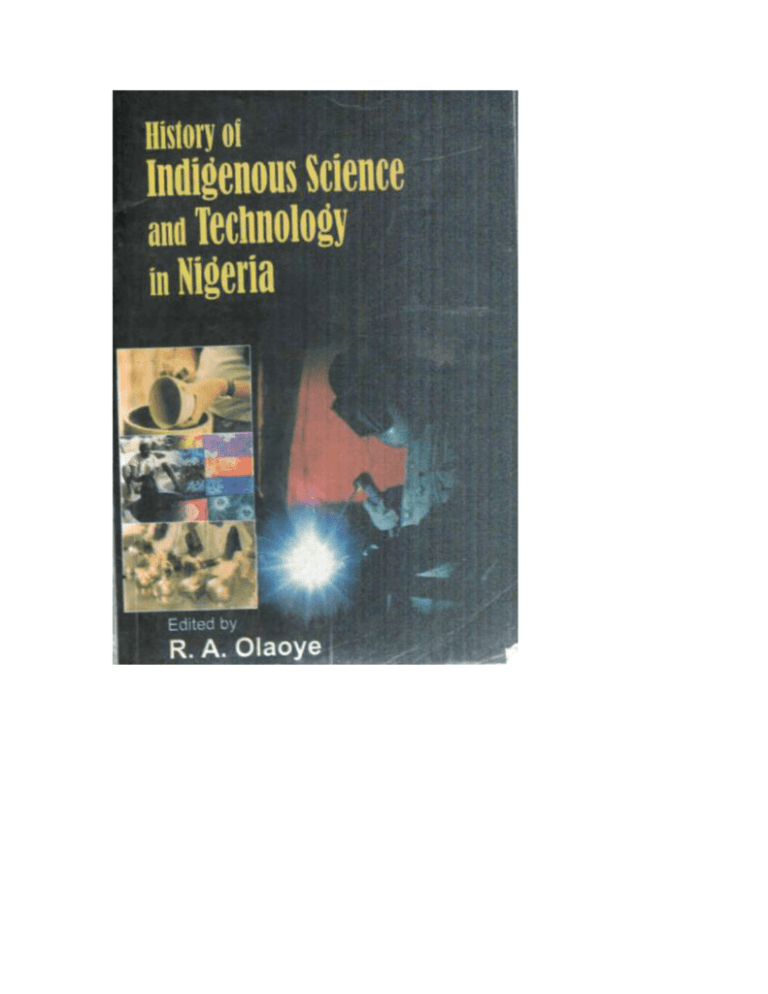
Published by
Cresthill Publishers Limited
No. 2 Adebayo Salami Close,
Basorun, Ibadan
Tel: 08033909437, 07026262986
R. A. Olaoye (Ph.D) 209?
ISBN: 978-978-490-92-0-4
All rights reserved. No part of this publication may be reproduced,
stored in a retrieval system or transmitted, in any form, without
the prior written permission of the publishers.
CONTENTS
Note on Contributors
Page
v
vi
vii
ix
xi
1. The Concept of Science and Technology
R. A. Olaoye
1-13
2. How Colonialism Destroyed Indigenous Technology:
The Case of The Metallurgical Industries
of Northern Nigeria Nurudeen Abubakar
14-32
Dedication
Acknowledgement
Introduction
Foreword
3. The Making of Soap In Ublu-Uku Up To 1911
E. C. Emordi
4. History: A Desideratum in Nigerian Technological
Development
Jide Ige
44-53
5. Igala Sculpture
Attach N, Echa
54-68
6. The Colonial Textile Development Scheme 1945-50:
A Horoscope for Policy Making on Industrial
Development In Nigeria A. T.Ajayi
69-88
7. Distilling Industry In Pre-Colonia! Ibibio Society
A Study of Ufofop (Local Dry Gin) Beverage
Dominic Akpan
97
89-
shifting cultivation, crop rotation, green manuring, mixed farming,
poultry and regulated swamp farming. 4
The manufacturing of hoes and cutlasses was a landmark in
the history of agricultural technology in Nigeria, in the sense that
the tools so manufactured replaced wooden and stone tools, which
were used by the early man. Thus, the new technology contributed
immensely to food production. The new technology was also aided
by a correct evaluation of soil potential.
Indeed, the people of Nigeria devised various means of
preserving their surplus crops. For instance, yams were buried in
the soil while beans were buried in ashes. The beans could be there
for more than a year without getting spoilt. This traditional method
of preservation has neither been studied nor documented by colonial
masters and post independenceNigerian rulers. Equally, technique
like the processing and preservation of palm oil has been awfully
neglected. The point one is making here is that all these processes
(traditional techniques) apart from been properly documented ought
to have been studied and modernized, This would have been a way
out of technological backwardness rather than considering them
irrelevant to the development of modern technologys.5
Pre-Colonial and Colonial Times
Before the imposition of colonial rule, Africans were self reliant in
their technical know -how. In fact, during the European first contact
with Africans in the 15'h century, they (Europeans) appreciated the
level of African development in technology. It was on the basis of
this that the Europeans initially traded with the Africans on the
principle of equality. Actually, the Africans occupied the position of
owner (master) who dictated the type of goods to be sold and at what
price to sell them to the European merchants. The European saw and
appreciated the high level of African technology in the area of
carving, soap-making, canoe-building, weaving, brass casting and
architecture6. Evidently, when the Dutch visited Benin in the
15th century, they described the city in these words:
"the town seems.... great. When you enter into it, you go
into a great brood street u7nV/i seems ... broader than the
Warmoes Street in Amsterdam "
In the pre-colonial and even in the early colonial era, Nigerians
engaged in manufacturing, iron smelting, weaving and others.
Owing to the needs of the people, specialization in various trades
arose. The Benin people specialized in brass and bronze industry.
The Nupe specialized in glass and bead industry. The point here is
that specialization is a manifestation of the people's ability to
influence nature and environment to service their needs. Rather
than studying and modernizing all the processes involved in these
industries, both the colonial masters and post independence Nigerian
rulers have regarded them as crude, traditional and archaic, (hereby
making the country more dependent on foreign technology.
Similarly in the 15th and 16th centuries, European brought
Indian clothing materials to Africa for resale. At the same time,
Europeans brought cloths from some West Africans including Benin
and Yoruba people to be resold at home. Such textile technology
ought to have been modernized-a step towards technological
advancement and self reliance in textile technology.
Consequent upon. European encroachment on African soil, a
good number of Africans through a deliberate colonial, economic
policy, including taxation and forced labour, were compelled to
concentrate on the production of agricultural crops for export.
During the colonial period roost people turned to the production of
cash crop (cocoa, groundnut, coffee, cotton etc) which fed the
European and American industries at borne. There was no
appreciable effort on the part of the Europeans, particularly the
British to improve any of the traditional technology not to talk of
making Nigerians masters of Western technology.8
As mentioned earlier, Nigeria was notable for brass and bronze
making. The monuments caught the attention of the Europeans
who stole some of them which are now found in some museums in

